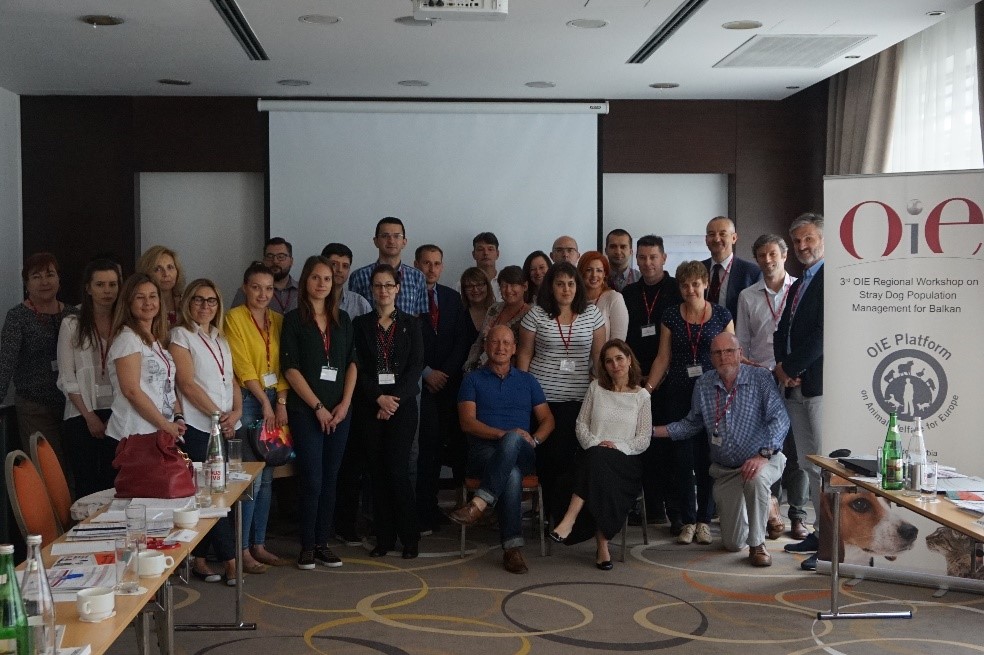Third OIE Regional Workshop on Stray Dog population management for Balkan countries (SDB3) was held on 13 – 15 June in Belgrade, Serbia.
This workshop is an integral activity of the Regional stray dog Roadmap on for Balkans launched in June 2014 with the objective to become compliant with the Chapter 7.7 of OIE Terrestrial Animal Health Code by 2025.
The OIE deeply thanks the European Union, Switzerland, and Royal Society for the Prevention of Cruelty to Animals and Serbia for their significant financial and/or technical support.
Nine Balkan countries attended the meeting, namely: Bosnia and Herzegovina, Bulgaria, Former Yugoslav Republic of Macedonia, Greece, Kosovo*, Montenegro, Romania, Serbia and Turkey.
The workshop objective was to assist countries in achieving full compliance with OIE standard on stray dog population control (and rabies) by 2025, with a specific focus on how to elaborate a national dog population control programme (with a rabies component).
More specifically the Workshop aimed to:
As part of the workshop preparatory activities, countries were requested to conduct their second self-assessment using the OIE stray dog Self-Assessment and Monitoring (SAM) Tool, to measure progress since the first self-assessment (2015) and reinforce efforts to fill remaining gaps towards full compliance. The results of countries second self-assessment were compiled in National Reports, and presented and discussed during SDB3 workshop in plenary sessions and individual country interviews.
Presentations from the workshop
Session 1 — Setting the scene session:
Plenary lecture: OIE new developments on Animal Welfare – L. Stuardo (OIE) by teleconference
Plenary lecture: OIE / WHO Global Framework and Global Strategic Plan to prevent human deaths from dog-transmitted rabies by 2030 – T. Grudnik (OIE)
Plenary lecture: OIE Platform for Animal Welfare in Europe – New development since 2016 – N. Leboucq (OIE)
Country experience: Best practice in promotion of OIE standards for stray dog management by non-governmental organizations involved in animal welfare and local economic development – T. Causevic (National Alliance for Local Economic Development, Serbia)
Quizz: Reminders on Chapter 7.7 of the OIE Terrestrial Animal Health Code – N. Leboucq (OIE)/All
Session 2 — Understanding country’s situation and progress since 2016
Countries presentation:
Bosnia and Herzegovina
Bulgaria
Former Yugoslav Republic of Macedonia
Greece
Kosovo*
Montenegro
Romania
Serbia
Turkey
Plenary lecture: Results of the second self-assessment (regional trends) and remaining gaps to achieve the Vision – T. Grudnik
Session 3— Developing a national Programme
Regional Animal Welfare Centre (RAWC) Workshop: Dog population counting survey and setting indicators for dog population management – A. Hammond-Seaman (RSPCA) and D. Terzievski, D. Kovač, T. Mikuš, E. Poposka, M. Weintzner (RAWC)
Country experience: Creating evidence-based dog population management programme at local level: results of the first comprehensive baseline research in one municipality of Serbia – J. Ilic (ORCA, Serbia)
Plenary lecture: Establishing a stray dog Advisory Group – P. Dalla Villa (OIE Collaborating Center IZSAM)
Plenary lecture: Presentation of the template on the national Action Plan – N. Leboucq / Stray dog ‘Task Force’
Session 4 – Addressing specific country needs (topics proposed by countries)
Plenary lecture: Identification and registration of dogs (establishment of a national database) – P. Dalla Villa
Plenary lecture: Assessing animal welfare in shelters – P. Dalla Villa
Plenary lecture: Assessment of dog aggression-test on socialization of dogs (with focus on stray dogs) – B. Faulkner (Stray Animal Solutions, UK)
Plenary lecture: Establishing a register of dog breeders and control of movement of dogs – E. Vleugels (Flemish Government, Belgium)
As the next steps countries are expected:
To support Balkan countries in the development and implementation their National Veterinary Service strategies/plans, and the progressive compliance with OIE standards, it is proposed to organise the SDB4 workshop in June 2020 (provided funding is available).
